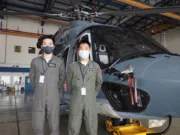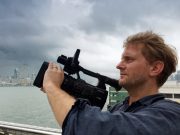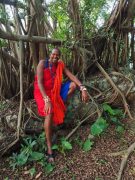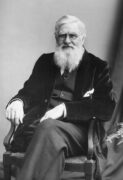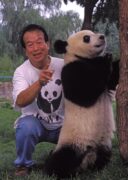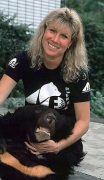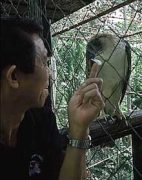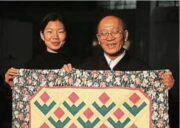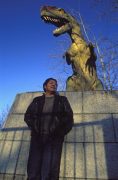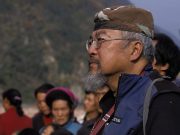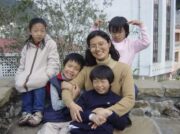In October 2002, boxes of clothes began arriving in Burkina Faso, a country in West Africa, and they were all addressed to the same individual.
The boxes of clothes were sent by mostly Taiwanese people (some also came from places like Hong Kong, Japan, the United States and Sweden) wanting to help the residents of Burkina Faso, one of the poorest countries on earth. Instead of responding to an appeal by a major relief agency, they were sending the clothes to a 26-year-old doctor from Taipei, Allen Lien. Though he sports a beard and barely tamed hair that contribute to a rugged, island castaway look, Lien is a level-headed, peaceful man. During his one-year stint as a volunteer doctor in Burkina Faso, he felt compelled to do far more than just attend to people’s medical needs, by aiding and initiating projects to improve living standards as best he could.
Like father Allen Lien’s work as a volunteer doctor in Burkina Faso is like a huge but natural step from volunteer work by his father, John Lien. John has a dental practice in Taipei, and has long devoted his major holidays to giving free treatment in poor parts of Taiwan.While Allen Lien was growing up, he had followed his father on weeklong trips to the Penghu Islands, which lie around midway between Taiwan and mainland China, to provide free medical services. John told his son one of his favourite quotes, from African American George Washington Carver: “Start where you are with what you have; make something of it: Never be satisfied.” Allen Lien took these words to heart.
Allen Lien decided he too would study medicine, and enrolled in Taipei’s Yangming University.On graduating in June 2001, Lien opted to become an overseas medical volunteer as an alternative for the two-year compulsory military service. He was entered into a draw for places in one of Taiwan’s four overseas medical missions.
Lien decided Burkina Faso was his first choice. This was partly as he would have a chance to learn French – the national language thanks to a colonial past.
[This article first appeared in the Chinese edition of Reader’s Digest, May 2005. Reader’s Digest holds copyright in the text.]
On 12 November 2001, Lien started his journey to Burkina Faso’s capital city, Ouagadougou. As Lien was driven the 100km east from the capital city to his new base, he glimpsed the true nature of this impoverished country. It was winter, the dry season, and the land was mostly yellow with sand and dusty fields. There were few tall trees. Lien passed villages, with houses of mud walls and straw roofs – most had no electricity or running water.
Lien’s medical mission was in Koudougou, which is one of Burkina Faso’s main towns. On arrival, he was escorted to a dormitory beside a hospital, the conditions of which were luxurious compared to the typical conditions in the area. They had a television, karaoke, Internet access, etc. Lien was assigned a room with an ageing air conditioner.
From the dormitory, it was just a few metres’ walk to the hospital. Yet a great deal changed in that few metres is like walking from heaven to hell. The hospital was a single-storey complex. There were no computers – medical records were handwritten on charts. There was no air-conditioning, even though temperatures outside could soar to a basting 50C. Working in the mornings, Lien held consultations, and made ward rounds. Many patients were so poor that they skimped on buying drugs, so Lien found curable illnesses often lingered or worsened. Lien occasionally used his budget to help patients buy simple medications.
Some drugs simply weren’t available. There was no triple-drug therapy for AIDS, which afflicted around 40 percent of people referred to the hospital. Although hospital work could be frustrating, he continued, and went to village clinics for consultations that were also part of his assignment. Encouraged by meeting French volunteers who did good work like drilling wells and building schools with little funding – instead of needing US$1 million or more channelled via presidents – he began his livelihood-enhancing projects.
Bags for clothes
Lien has helped countless people he doesn’t know personally – including by distributing clothes, which arrived in two main batches, neither of which he directly requested. The first batch was his father’s idea, sparked by Lien remarking that Burkina Faso people were very poor, and often wore the same clothes day in, day out as they had no others to change into. John Lien told his pastor and members of the congregation of his church in Taipei, and they were happy to collect second-hand clothes. They posted them to Lien in sixty old fruit boxes.
Lien stored the boxes, and wondered how to distribute the clothing. Walking the streets of Koudougou, he hit on a plan. They were strewn with black plastic bags, which people received in markets and shops, and simply threw outside as there was no refuse collection. The bags blew around, decorating trees like untidy bird nests; sheep occasionally ate them and choked to death.
After Lien explained the scheme to pastors in Koudougou churches, they announced during Sunday services, “If you come with three plastic bags full of other bags, you can have one item of clothing.” The plan began on 13 June 2002. Within two hours, the sixty boxes of clothes were all distributed.
Though Lien hoped to recycle the bags, he eventually found this was impractical, and burned them. Thinking that was the end of the campaign, he sent an email recounting events to his family and others who were interested in his work.
And the email began circulating. And circulating. And clothes began flooding in to John Lien’s church.
Mostly, the clothes came from within Taiwan. Others arrived from Chinese-speaking communities in Hong Kong, Japan, the US, Germany, and Sweden. They added up to 1,500 boxes!
As there was still no refuse collection system, the bags soon reinvaded the streets of Koudougou but the clothes distribution did have a lasting impact: Lien occasionally saw people in clothes with Chinese characters, and children and adults sometimes recognised him in the street, and excitedly announced, “I got these clothes from you!”
In another village where Lien gave consultations, he was shocked to find residents relied for water on children making eight-hour round-trips to a good well, or simply drank muddy water from their own, shallow well. There was a deeper well, but the pumping gear was ruined.
Enquiring about the situation in April 2002, Lien discovered the best solution would be to drill a new well. A villager who worked as a government engineer announced he could do this for the equivalent of NT$220,000, and Lien emailed his friends and family in Taiwan, asking for donations.
Among the recipients was a Mrs. [Chen]. After seeing pictures of the muddy water in Lien’s email, [Chen] told her husband that instead of wanting jewellery as birthday present, “I’d like a well in Africa.” He gave NT$110,000, and [Chen] added NT$20,000 of her own money.
With [Chen]’s and other donations, Lien achieved his target.
The wells were completed on 18 June 2002, and Lien had the satisfaction of drawing water from one for the first time. The clear water pumped out was far healthier than the muddy broth from the shallow well. Children used it to water a small garden that had been dry and barren, and within three months harvested tomatoes and other vegetables.
Chance to learn
One day in late spring 2002, Lien became friends with a teacher named Issac. Lien remarked, “I’ve just seen a lot of children going to school carrying notebooks, and a there was a man there with a list he was checking. What was going on?”
Issac explained that the school collected money from each pupil to cover repairs and other work. Those who couldn’t pay would be expelled just before their final, summer exams, and the man had the list of their names. Lien went to see the headmaster, and told him, “Give me a list of the children who can’t pay, and who have lost one or both parents, and I’ll pay for them.” The headmaster produced a list of 70 names, and Lien dipped into his annual budget to pay the equivalent of NT$3500. His charitable act made him well known in the village.
Another teacher in the village told Lien that the school only had enough money to provide one textbook for every four to ten children. There was a high failure rate because of the lack of resources, and children having to spend long hours looking after sheep and fetching wood.
“I’ll try to do something,” promised Lien.
Lien had by now received some money towards his charitable work, and he drew on these funds to ensure there were books for each pupil in the two schools in the village. One of the donors was Lien’s university professor. Lien emailed her a report with photos. She replied, “I’m happy to see I can do a lot with a little money.”
Building orphanage
In the same year, Lien began another project. The hospital’s director of social work, Gilbert Tiendrewego, told Lien that he had been trying to build an orphanage in a village, but had failed to find the necessary funding.
“I’m not sure I can raise the money, but I don’t mind giving it a try,” Lien said. Lien assembled a small team of volunteers and began the groundwork for the orphanage. The villagers agreed to give four hectares of land. Lien again turned to his supporters in Taiwan, seeking donations.
Lien explained to the donors that Burkina Faso has many orphans and near-orphans. This is partly because the average life expectancy is only around 47, and people might have children when they’re 40. A man may have several wives, and if he leaves or dies, they have no way of supporting their children.
With monies received, actual construction began in February 2003. By June, five buildings had been completed.But as the buildings were completed, Lien’s 20-month volunteer period ended, and he had to return to Taiwan.
Once back in Taiwan, Lien gave a succession of talks and media interviews about his exploits, and sought further donations. He also met his girlfriend of seven years, Tina Kao – whom he’d barely seen in the last three years, due to her studying in the US, and his foray to Burkina Faso. They married on 4 January 2004, and Tina joined him in Burkina Faso, helping with different aspects of work.
“I’m not trying to change the world, nor to save Africa,” he says. “I know my limits – and even if all the wealth of Taiwan went into Africa, it couldn’t help all the people. It’s a bottomless hole. Instead of major changes, you can change the world around you. That’s sufficient for me: the lives of some of my friends have changed because of my presence. ”
Epilogue:
Prior to leaving Burkina Faso, Lien purchased a piece of land in the rural area of the old city where he has established an office, a soap factory, a consultation centre for AIDS patients, a library, etc. to help local residents. He has assigned those facilities to the church’s management and will continue to promote other activities with his wife.
Allen Lien article in Chinese (pdf)
Top People
Helicopter crews brave mighty winds and waves to rescue seamen during South China Sea typhoons
On the morning of 2 July 2022, as Hong Kong was lashed by gales and rainstorms…
James Reynolds typhoonhunter and volcano videographer
An Eye for the Storm As Super Typhoon Dujuan slammed into northeast Taiwan late on 28…
Maasai safari guide Jackson Looseyia
BAD-TASTE BLOOD My home village had about 15 people in it. What we think of as…
A Man for All Sequences Frederick Sanger
November 2013 saw the death of a man described by Craig Venter, among the pioneers of…
Blue light at last wins Nobel for LED titans
While the 2013 Nobel Prize in Physics was for an esoteric advance in knowledge — theoretical work…
Genius of the Jungles: Alfred Russel Wallace
Recently came news of a study finding that the distribution and evolution of Galapagos wildlife have…
The butterfly and the remarkable Professor Hofstadter
This spring, there was excitement in the world of physics as a long-predicted butterfly was proved…
James Hansen Godfather of Climate Change retires yet will be very busy
This month [April 2013], climate scientist Dr. James Hansen retired as head of NASA’s Goddard Institute…
Pan Wenshi: Scientist Who Fights for the Pandas
In a cave near a tributary of the Youshui River, Pan discovers Jiao Jiao, an eight-year-old,…
Jill Robinson helping bears
First Jill Robinson was shocked, then she set out to stop the suffering The Great Bear…
Jessie Yu – Hong Kong Single Parents Assoc founder
The best way to get ahead, says this tireless Hong Kong philanthropist, is to help yourself.…
Keeper of the Kings: Captive breeding Philippine Eagles
One man’s perseverance offers hope to a critically endangered bird of prey On a warm, sunny…
Dr Yang Lihe helping former leprosy patients
Dr. Yang Li-he has spent his life helping cure leprosy. Now he is helping former patients…
Dinosaur hunter Dong Zhiming
Unearthing China’s Real Dragons Dong Zhiming, 26, walked atop a low cliff of red and yellow…
Dramatic rescue by brave helicopter crew from roof of blazing Garley Building in Kowloon
Captain Mike Ellis eased the Sikorsky Blackhawk in towards the beleaguered, 16-storey Garley Building, in the…
Mountain Dog and rebuilding schools in China
I’m at a charity ball in Hong Kong, seated among a hundred guests in a bright…
Mother Ko’s fight for justice
The more lawmakers ignored her, the more determined she became to seek justice On a grey,…
SARS doctor and heroine Yannie Soo
A mysterious illness was striking the medical staff down one by one. How could they fight…
Teacher Lin helps kids in Taiwan
Teacher Lin has a dream, in which more and more needy children find their home sweet…

